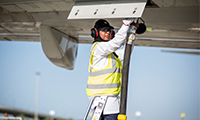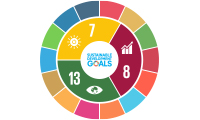Living by our principles
Our core values of honesty, integrity and respect for people underpin our work with employees, contractors, suppliers, non-governmental organisations and others.
The Shell General Business Principles describe the company's core values, its responsibilities, and the principles and behaviours by which we do business. They also include Shell’s commitment to contribute to sustainable development – the need to balance short- and long-term interests, integrating economic, environmental and social considerations into business decision-making. We aim to do business fairly, ethically and in accordance with all applicable laws.
All Shell employees and contract staff must follow our Code of Conduct, which guides employees on how to apply the Shell General Business Principles in line with our core values. Employees and contract staff are also required to complete Code of Conduct training regularly and to confirm they understand their personal responsibilities under the Code of Conduct. Contractors must also follow the Code of Conduct when acting on our behalf.
Read our Code of Conduct at www.shell.com/values.
In 2018:
Shell global helpline
Reports to the helpline
Code of Conduct
Substantiated allegations
Taking action
Employees or contractor staff subject to disciplinary action
Taking action
Contract terminations or dismissals
Speaking up
Shell employees, contractors and any third party can report any potential breaches of the Code of Conduct confidentially and anonymously through several channels, including a global helpline, which is operated by an independent provider.
Shell has specialists who investigate concerns or allegations about a breach of our Code of Conduct. If a violation is confirmed, the appropriate Shell company will take appropriate action up to and including a contract termination or dismissal. We maintain a stringent no retaliation policy to protect any person making a good faith allegation. In 2018, we carried out extensive sessions for managers on harassment awareness and prevention to help ensure people in their team feel comfortable speaking up.
Internal investigations confirmed 370 substantiated breaches of the Code of Conduct in 2018 compared with 261 in 2017. As a result, we dismissed or terminated the contracts of a total of 92 employees and contract staff, compared with 73 in 2017. Most Code of Conduct violations related to protection of assets, conflicts of interest and harassment.
Tackling product theft
In August 2017, after an internal investigation, we reported to the Singapore authorities a suspected substantial product theft from our Pulau Bukom manufacturing site. The authorities arrested and subsequently charged several individuals in 2018, including eight former Shell employees. We have been working closely with the Singapore police force during its investigations, which are still ongoing.
What we uncovered is unacceptable and we are taking significant steps to prevent a similar incident from happening again. We are focusing on areas including the monitoring of products moving in and out of Pulau Bukom, the vessel management process, and ethics and compliance training. We are also working with government authorities and industry associations to address the issue of oil theft more broadly in the region.
Ethical behaviour
In 2018, we focused on simplifying the ethics and compliance tools and resources available to everyone at Shell. This also included giving senior leaders better insight into how well their teams are performing.
Our Ethics and Compliance Office worked to consolidate the existing internal manuals, bringing content together into a single manual, simplifying the language and redesigning the layout for digital publishing. In 2018, we launched our integrated ethics and compliance manual, at the same time making it publicly available (see Ethics and compliance manual at www.shell.com/values)
Additionally, an ethics and compliance dashboard was developed for use by senior leaders, giving them easy visibility of their organisation’s compliance with selected metrics, such as overdue training.
We launched an ethical leadership expectations programme for senior executives to explore and reinforce what Shell requires of leaders at this level. It focuses on values, behaviours, business pressures and leadership practice.
Read more at www.shell.com/codeofethics.
Anti-bribery and corruption
Shell has clear rules on anti-bribery and corruption and these are included in our Code of Conduct for all employees. There is no place for bribery or corruption at Shell. Read more about our values at www.shell.com/values.
Various national and international laws prohibit business involvement with certain individuals, entities and organisations. Our anti-bribery and corruption and anti-money laundering and trade compliance programmes set out the requirements for screening business partners. Using a risk-based approach, we screen potential business partners before and during the contractual relationship. In 2018, we carried out 7,759 enhanced pre-screenings for higher-risk contracts. Additionally, around 10 million counterparties are screened on a continuous basis against a range of trade compliance, anti-bribery and corruption and anti-money laundering watch lists.
Authorities in various countries are investigating our investment in Nigerian oil block OPL 245 and the 2011 settlement of litigation pertaining to that block (see Note 25 to the Consolidated Financial Statements in our Annual Report).
 Our people
Our people
 Sustainable development goals
Sustainable development goals
 About our data
About our data
 Electricity
Electricity